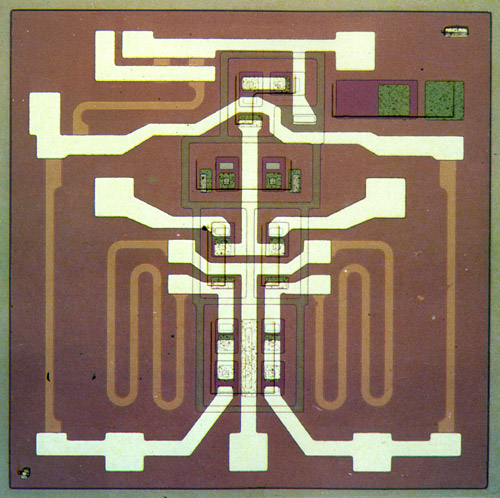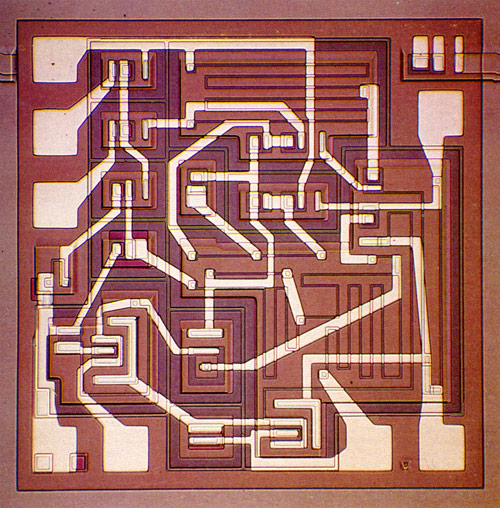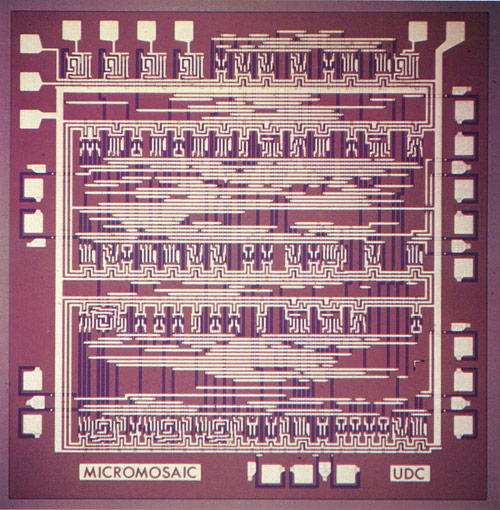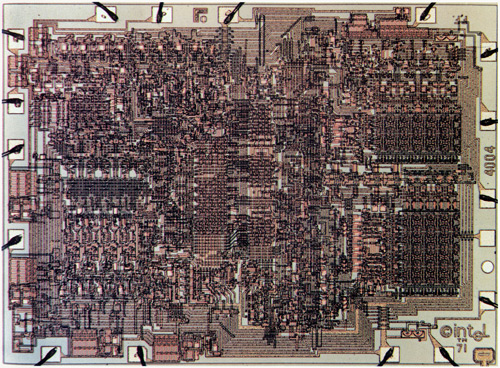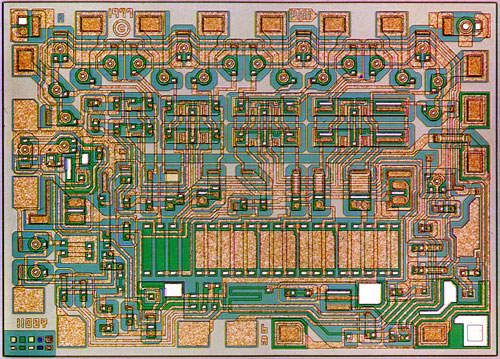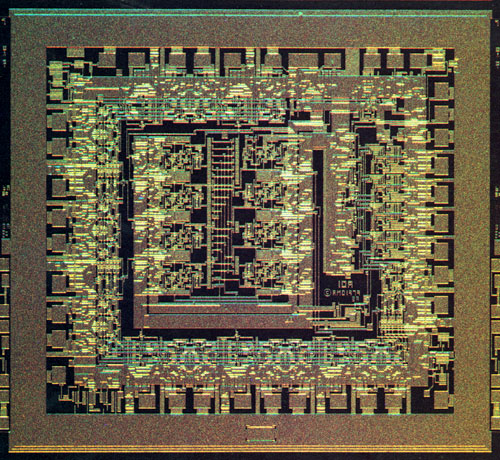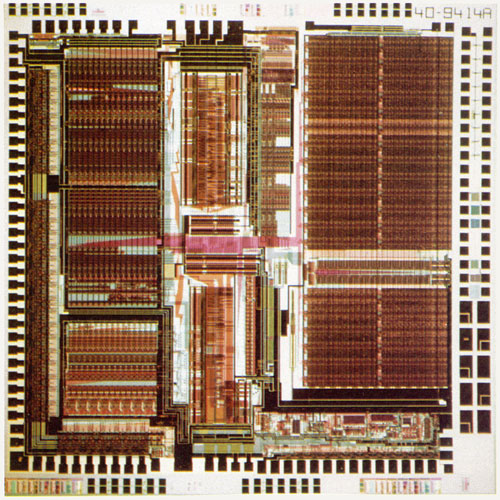There is something terrifically satisfying about seeing, with your own eyes, the humble genesis of world-changing creations. The image above is a case in point. What we see pictured here, as I’m sure many of you already know, is the world’s first integrated circuit, created by Jack S. Kilby in the summer of 1958. That this creation, with its bubbled wax and carefully twined wire, is the work of human hands is unmistakable. The seemingly messy, cobbled-together, simplicity of it is heartening somehow when one compares it to the microchips of present day, which a human hand is not meant to touch and could only hope to damage with its meaty, imprecise groping. This is a technology which though reality-shaping has, in large part, been complexified right out of direct human contact.

Objectified Circuitry


Seed text: The first 6 lines of Lawrence Ferlinghetti’s poem I Am Waiting (a critique of the American status quo, touching on false religiosity, crass consumerism, and the general absurdity of it all c.1958) which are as follows–
I am waiting for my case to come up
and I am waiting
for a rebirth of wonder
and I am waiting for someone
to really discover America
and wail.
Filtering mechanism employed: Google Maps.
Result: Voxx, 8230 Beverly Blvd, Los Angeles, CA.
Quote: “Voxx is the world’s most pre-eminent scholar regarding Demonology and Witchcraft. Voxx is featured in the book, “The Top 100 Psychics in America.” She is an initiate of several magickal orders, and is the High Priestess of the Circle of Aradia. Among her abilities are the casting of Astrodice, Bibliomancy, Channeling, Pyromancy, Scrying, and Spirit Evocation. She is one of a handful of individuals who can fluently speak the the Magickal Enochian language. Voxx has appeared on many national television and radio shows, as well as in several films. Voxx is a published poet. Voxx is also a Screenwriter, Filmmaker, Photographer, Painter, talented electronica musician, and Multi-Media Artist. Voxx’s clients (who include the members of Motley Crue, Tara Reid, and Howard Stern) have been regularly astounded by her ability to successfully and accurately predict the names, dates and details regarding their future Soul Mates, as well as the subsequent birth of their children.”
This result was the first returned because Voxx is mentioned on a site called rip-off report by a consumer in Staten Island who had paid for and cast Voxx’s “spells” but wasn’t initially satisfied because his “demands were not being fulfilled.”
Conclusion: Intentional misuse of data filtering tools shifts context and allows for the machine discovery of multilayered, wail-worthy, illustrative perfection. Truly a wonder.


Patented for Your Pleasure
What are the things we as a species enjoy? I’m going to go out on a limb and pick two- We enjoy sexual pleasure, and we enjoy tinkering with stuff. The confluence of these two interests have lead, over time, to more sexual gadgetry than you could shake an electrode covered phallus at, and it’s amusing for a couple of reasons. For one, I don’t think with all our noodling we’ve ever actually improved on good ol’ sloppy biology. Secondly, and this is the mouth of the comedy gold mine, all these endless inventions of ours must, if they are to ever to hit the market and enter the orifices at large, pass through the patent office. Can you think of a more incongruous pairing than brute sexuality and government forms? Or of the mysterious workings of human arousal and technical diagrams?


Robot Folktales
Have you ever found yourself, sitting there at the office or behind a neighbors shrub, wondering, “What would a robot tell me if I weren’t so self involved and just gave it the chance to talk about itself?” I think we all have. It’s one of the great burning questions. Yet even in this magical age of information and technology, in which we enjoy the benefits of rocket ships and self-raking litter boxes, the answer has not been forthcoming. Or at least that’s what I thought before meeting Bluebell and Hector, a couple of genteel robots with tales to tell.
Tips for greater efficiency for example:
#2. Don’t waste time on decisions. Always choose the third from the left.
#3. Think about the bees. If they can succeed so can you.
#4 Get a nickname, preferably “The Colonel.” This will save you years of effort.
Hearty kudos go to Emma Payne for dragging our sorry asses into the red-wallpapered, naturalist illustrated, future. Because truly… any future in which I can’t listen to a robot recount its dreams or read me its latest poem is not one I want to spend a hell of a lot of time in. Brilliant.


Video art, alternative television, McLuhan, performance art, computing, Buckminster Fuller, copyright, the electromagnetic spectrum, the Sony Portapak, feedback, activism, tape loops, media criticism, electronics, modding, kline worms, information economies, defense of public access channels, cybernetic guerrilla warfare… In the days before VCRs and personal computers these and other disparate subjects were being plumbed in the seminal magazine Radical Software. Published between 1970 and 1974 by Beryl Korot, Phyllis Gershuny, and Ira Schneider Radical Software serves today as a fascinating historical document of the very beginnings of the video art movement and the far flung ideas which surrounded the revolutionary medium’s introduction. The full run is available online here. Highly recommended.

A couple of weeks ago I saw a link somewhere to a “list of fictional something-or-others” at Wikipedia. Might have been fictional expletives or fictional gods (which by the way is far too long a list since it could have been summed up easily in a single word, I’ll let you guess what that word is); I can’t rightly remember. I got the bright idea though to do a broad search for “list of fictional” at Wikipedia, thinking the results might make for a nifty little post. The search turned up a whopping 2150 results! That’s a lot of fictional stuff. Too much in fact. I mean how do you choose between fictional chimpanzees, fictional drugs, fictional robots, fictional universes, fictional narcissists, fictional books, notable mustaches in fiction, etc, in order to craft a cogent post? You can’t. So I scrapped the idea.

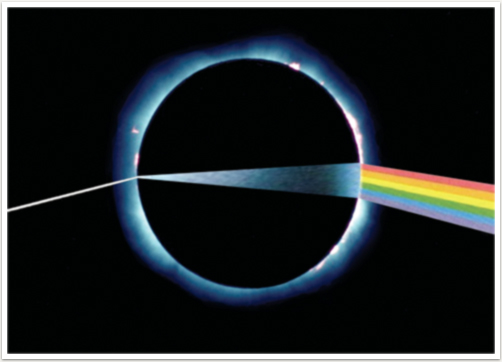
Quote, “Some stars undergo a natural process that generates acoustic waves similar to those produced by wind instruments. The gas inside the star contracts and expands, which leads to a heating and cooling cycle. This periodic change in temperature alters the star’s light intensity, and astronomers can detect the resulting pulse patterns with telescopes. Kolláth and Keuler use this data as a basis for their music, but after one critical adjustment: Since the frequencies of star sounds are much too low for humans to hear, the team uses a computer program to shift the pitches by as many as 30 octaves—over four times the difference between the highest and lowest notes on a piano. So essentially, stars produce sound waves that appear visually as patterns of light, which are then translated into music.” Seed story on astrophysicist Zoltán Kolláth and composer Jen? Keuler’s Stellar Music Project.
Related: space sounds, space audio, ESA sounds from space, space weather vlf receiver, listening to leonids, sounds from space: sonification applications, NPR The Musical Sounds of Space, and the sounds of Titan.

Quote, “In the beginning was the Word. There was a little pond and in the pond was a little letter “O”, a word. Soon the pond was full of trillions of O’s, happily mouthing their meaning. And the word was fruitful and multiplied. Then something happened. An “O” changed to an “I”. Another changed to an “A”. (Others changed to “x” and “p”, but these were not fruitful and were, sadly, deselected.) Soon, the pond was swimming with O’s and A’s and I’s. The I’s, in particular, thought they were something special, but the O’s were happy just to be noticed…” Zachriel’s Sea of Beneficence, part of the larger Word Mutagenation.


What Hath God Wrought?
On this date in 1844 one Samuel Morse asked an age old question in a new way, and in so doing kicked the practice of Telegraphy in its intangible ass. It was the first message ever sent in Morse code. Unsurprisingly an answer was not forthcoming. 162 years late, let me hazard an answer: misery
human suffering.


A history of the pen. A brief history of writing instruments. The history of the ballpoint pen. How ballpoint pens work. The early history of the fountain pen. The pen trade. The Paul E. Wirt fountain pen. The story of the invention of steel pens. The four treasures of the study: brush pens. Quills. Cutting a quill pen. Fox with quill. Cat with quill. The writing [implement] of Jane Austen - the quill pen.
Mark Twain’s pens. Presidential pens. More presidential pens. The instruments of presidents, peace and international politics. The “billion-dollar” space pen. More on the space pen. Vintage pens. Pen profiles. Pen collection. Pen lovers. A collection of pre–1850 writing implements. Waterman’s writing implements. Vintage pen ads, blotters, and ephemera. Lion & pen. Nibs. Nibs. More nibs.




